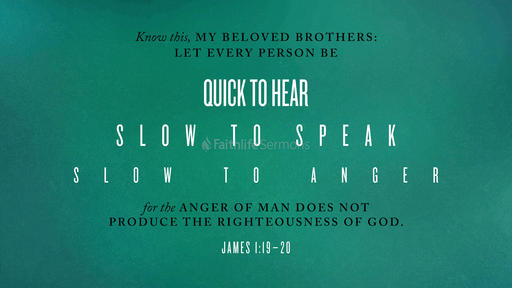Make Way for the Word
Sermon • Submitted • Presented • 22:40
0 ratings
· 34 viewsFiles
Notes
Transcript
Sermon Tone Analysis
A
D
F
J
S
Emotion
A
C
T
Language
O
C
E
A
E
Social
Make Way for the Word
Oct 31, 2021
Craig Minke
* In our world today seminaries, and Bible colleges try very hard to turn tongue-tied young people into dynamic communicators. They teach the best methods, provide practice and give critiques
* There is however a part of the process the teacher or preacher has no control over and the is the attitude of the hearer.
* Notice in the parable of the sower, it is the soil and not the seed that determined the level of productivity.
* James was well aware of these problems
ILLUSTRATION: As the old saying goes you can lead an old horse to the water but you can't make him drink.
JS 1:19-25 19 My dear brothers and sisters, take note of this: Everyone should be quick to listen, slow to speak and slow to become angry,
20 because human anger does not produce the righteousness that God desires.
21 Therefore, get rid of all moral filth and the evil that is so prevalent and humbly accept the word planted in you, which can save you.
22 Do not merely listen to the word, and so deceive yourselves. Do what it says.
23 Anyone who listens to the word but does not do what it says is like someone who looks at his face in a mirror
24 and, after looking at himself, goes away and immediately forgets what he looks like.
25 But whoever looks intently into the perfect law that gives freedom, and continues in it-not forgetting what they have heard, but doing it-they will be blessed in what they do.
In light of this James give practical advice to how to respond to the Word of God.
* Let's look at verses 19-21 again
JS 1:19-21A 19 My dear brothers and sisters, take note of this: Everyone should be quick to listen, slow to speak and slow to become angry,
20 because human anger does not produce the righteousness that God desires.
21 Therefore, get rid of all moral filth and the evil that is so prevalent and humbly accept the word planted in you, which can save you.
1. PREPARATION FOR THE WORD
The first step in the preparation for the Word is to "be quick to listen."
* He who is listening is learning.
* We need to be quick to hear the word of God
* The thrust of these three verses is found in verse 21, receiving the word will spiritually save our life.
* The greatest temptation in the world is for a person to walk through life doing what he wants and pleases, and thereby ignoring, neglecting and rejecting God.
* The result of this is DEATH - SPIRITUAL DEATH.
JS 1:15 15 Then, after desire has conceived, it gives birth to sin; and sin, when it is full-grown, gives birth to death.
* A person who has accepted Jesus as his/her Savior must prepare themselves.
* He must be quick to hear the Word of God
* How can a person make sure they hear the word of God and receive the word of God for their salvation.
* This passage talks of 3 ways we can prepare for the hearing of the word.
JS 1:19-21 19 My dear brothers and sisters, take note of this: Everyone should be quick to listen, slow to speak and slow to become angry,
20 because human anger does not produce the righteousness that God desires.
21 Therefore, get rid of all moral filth and the evil that is so prevalent and humbly accept the word planted in you, which can save you.
a). He must be slow to speak.
* This means that a person must be willing to listen instead of speaking his own ideas about right and wrong and about how a person is saved.
* He must sit and listen instead of hanging on to his own ideas; he must be willing to listen to God's Word instead of insisting upon what he thinks.
* Constant speaking means we aren't in a mode to receive information.
ILLUSTRATION: A wise man once said that we have two ears and one mouth, so that ought to be the ratio of listening to speaking.
b). He must be slow to wrath or anger.
* Where does anger erupt?
* Knowing the places and the ways that we are tempted can help us prepare by praying and by planning alternative responses instead of giving in to anger:
* Family-When we are misunderstood, ignored, unloved, criticized
* Church-When we are unnoticed, overlooked, unappreciated, criticized
* Workplace-When we are slighted, overworked, harassed, criticized
* Friends-When we are left out, disappointed, criticized
* Society-When we feel singled out for unfairness, taxed, criticized
* A person most not become angry and act against others in wrath.
* Anger and wrath disturb and distract.
* An angry person cannot focus his thoughts and spirits upon God's Word, not enough to hear what the Word is saying.
* The ability to defeat anger allows us to listen to unpleasant truths.
* When we are angry, our thinking is out of balance, our reasoning is undependable
* An angry person just cannot do what God says; he cannot live righteously nor receive the righteousness of God's salvation (as verse 20 says)
c). He must put aside all filthiness
* The picture is that of taking off a dirty garment and putting it aside.
* A person must put off every dirty thing and lay it off to the side away from himself.
* If he enjoys the dirt and filth, then his mind is going to be on it.
* His mind will not be clear, not enough to hear the Word of God.
ILLUSTRATION: William Barclay makes the point that the Greek word for "filthiness" (ruparia) is taken from the Greek word rupos. The word is sometimes used to refer to wax in the ear (The Letters of James and Peter, p. 66).
* The picture is descriptive: a person with wax in the ear cannot hear the Word of God, not clearly.
* Therefore, he must take the wax out of his ear and put it away or else he will be deaf to the Word of God.
* He must put aside all that remains of naughtiness, wickedness, and evil.
* The idea is this: even after putting aside all filthiness, there will still be some naughtiness or wickedness that will show up within us.
* Therefore, we must be alert to these uprisings and put them off and lay them aside as well.
* We must be completely clean and pure from all dirt and naughtiness in order to hear the Word of God.
* If we are nurturing secret thoughts, it is difficult to accept the truth of God
2. NOW WE MOVE THE RECEPTION OF THE WORD OF GOD
JS 1:21 21 Therefore, get rid of all moral filth and the evil that is so prevalent and humbly accept the word planted in you, which can save you.
* First, we must take the word seriously.
* God has given man a great but risky responsibility.
* He lets us decide if we will accept His Word or not.
* James then says we must "humbly accept" the authority of the word.
* The attitude of humility is really a prerequisite.
* We need to let God's Word rule over us, not us rule over it.
* We must receive the Word of God with meekness.
* We must be as a child before God our Father, that is, sit before Him meekly just as a child does his father.
* The idea is that we must be humble, gentle, quite, and ATTENTIVE in LISTENING to the Word of God.
* Listening to the PROMPTINGS of the Holy Spirit.
* We must sit and listen with an OPEN HEART ready to hear exactly what our Father says.
* We must understand the power of the Word. The power of the living God stands behind it. The Word has the power to convict and save.
The person who sits before God like this discovers a most wonderful thing.
* Note the word planted or "engrafted" (emphuton).
* It means to implant; to be born within (born again).
* When a person listens and hears the Word of God, it is planted within his heart and life.
* What God says is actually born within his heart, and the man hears exactly what God says.
* The Word of God is born within his heart and life and the person's soul is saved.
* He conquers and triumphs over all temptation, including the terrible temptation of rejecting God and doing his own thing and living like he wants.
* He is saved to live eternally with God.
* This is the first preparation that a person must make to withstand temptation: he must be quick to hear the Word of God.
After PREPARING for the word of God and RECEIVING he word we now come to
3. APPLICATION OF THE WORD
JS 1:22-25 22 Do not merely listen to the word, and so deceive yourselves. Do what it says.
23 Anyone who listens to the word but does not do what it says is like someone who looks at his face in a mirror
24 and, after looking at himself, goes away and immediately forgets what he looks like.
25 But whoever looks intently into the perfect law that gives freedom, and continues in it-not forgetting what they have heard, but doing it-they will be blessed in what they do.
* These verses now talk about applying the Word in our lives.
* Vs 22 says DO NOT BE A HEARER OF THE WORD ONLY.
* Contrary to what people think, it is not enough to hear and know the Word of God; we must LIVE and DO the Word of God.
* Many today claim to live under the authority of the Word and have never put what they know into practice
a). A person who only hears and knows the Word deceives himself
* If a person thinks that he can hear and learn the Word of God and then go out and live like he wants, he deceives himself.
* We can be knowledgeable about the Word but that isn't what saves us.
* We can memorize the whole Bible but that won't save us.
* Going to church every week won't save us.
* God accepts us because we confess out sins and repent.
* Repentance means that we turn away from our sins and turn to God.
* God accepts us because we turn to Him and live for Him.
* When we believe God-really believe Him-then it is that we trust and follow Him, doing exactly what He says
*
b) The person who only hears and knows the Word soon forgets what he has heard (v24)
* If a person does not practice what he learns, it soon fades from memory.
* It is just forgotten, and it never becomes a part of the person's life.
* He is like the person who looks in a mirror to see if he needs to do anything to his appearance, then walks away and thinks of something else and forgets the pimple or rustled hair that needed to be cared for.
* THIS HAPPENS IN OUR LIVES:
o As we read the Bible, as we study the Bible, as we listen to messages at church, as we are prompted by the Holy Spirit we are convicted of some defect, some shortcoming, some failure that we need to clean up.
o But as soon as we walk out from under the Word, we are DISTRACTED BY THE WORLD and its AFFAIRS and we soon forget to do what the Word of God told us to do.
c) Thirdly the person who hears and does the Word of God is BLESSED.
* Note that the Word of God is called the PERFECT LAW OF LIBERTY.
* This means that the Word of God will set a person free from the bondages of sin and death.
* The Word of God will free a person from all the temptations of this life and give him the full and victorious life for which his soul longs-a life that will continue on and on eternally with God.
ILLUSTRATIION: I want to bring to your attention seven ways in which we can listen intently to God's Word
* An intent look at God's Word is more likely to help us than casual attention will:
* 1. Read the Bible aloud to yourself with expression.
* 2. Use small cards with verses printed on them to refer to throughout the day.
* 3. Whenever a verse includes a command, think of at least three ways you can put that command into action that same day.
* 4. Ask someone else (maybe even a Christian that you don't know very well) to comment on the verse that you are trying to understand and obey.
* 5. Ask for an explanation when someone mentions a verse or passage you do not understand.
* 6. Memorize sections of God's Word.
* 7. Meditate on the parts of God's Word you have memorized.
* A person who does and lives the Word of God will find that he is freed from all that enslaves his soul upon earth. He will discover love, joy, and peace-a soul that just soars with a sense of ...
* freedom and liberty
* purpose and meaning
* security and safety
* victory over temptation
* joy and rejoicing
* assurance and confidence
* life over death
* deliverance from sin
* The Word of God is the law of liberty, the law that SETS A MAN FREE TO KNOW AND FELLOWSHIP WITH GOD FOREVER AND EVER.
* But note a critical point: we must CONTINUE in the Word of God.
* We must continue to live just like it says.
* If we do, then we shall be blessed, made abundantly and eternally happy.
* Law and freedom seem contradictory to us.
ILLUSTRATION: Traffic laws enable us to be free to drive safely. What if everyone decided to interpret the red light for himself. What if a driver said, "To me, the red means go"? The result would be utter chaos.
OR What if a football team arbitrarily decided that it takes only five yards to get a first down or that a touchdown would be one hundred points? The freedom to play the game depends on adherence to the laws.
* Laws tell us what we cannot do, and freedom speaks of what we can do.
* But, there is no freedom without a law that protects or provides it.
MATT 12:50 50 For whoever does the will of my Father in heaven is my brother and sister and mother."
LK 6:46-49 46 "Why do you call me, 'Lord, Lord,' and do not do what I say?
47 As for everyone who comes to me and hears my words and puts them into practice, I will show you what they are like.
48 They are like a man building a house, who dug down deep and laid the foundation on rock. When a flood came, the torrent struck that house but could not shake it, because it was well built.
49 But the one who hears my words and does not put them into practice is like a man who built a house on the ground without a foundation. The moment the torrent struck that house, it collapsed and its destruction was complete."
I JN 2:17 17 The world and its desires pass away, but whoever does the will of God lives forever.
SO WHAT IS THE CONCLUSION OF THE MATTER
* God cared enough for us that he sent us his instructions.
* We need to take his Word seriously.
* It is not just an academic study.
* It is the key to both eternal life and abundant life.
CLOSING PRAYER
"





